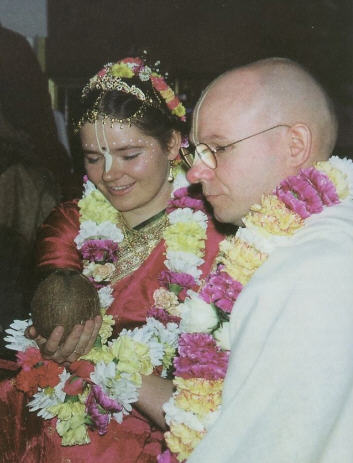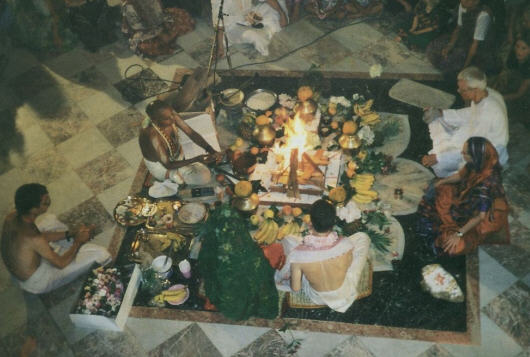Hare Krsna couples know from the start
that their life together has a spiritual purpose.

IN MY MOTHER'S wedding photo, she holds a thin bunch of flowers as if she wished to hide it somewhere. The Town Hall marriage chamber resembles a waiting room of an old-fashioned office. My parents, in their everyday attire of poor college students, look blissful but embarrassed, as if they cannot fully comprehend what is happening: Are we really married? What now? Get out and go back to our classes, or what?
In those times the sixties the young Polish intelligentsia took pride in abandoning the old rites of the Catholic tradition. Under Communist influence, marriage was thought of as merely a formality, a matter of signatures. Twelve years later, my parents placed their signatures on a divorce document.
I'm remembering this as I leaf through my own wedding album. In the background I can see my mother's face. Touched, she is watching as my husband and I throw grains into the sacrificial fire, while a devotee softly explains to her the meaning of the rituals.
In my childhood, I used to wrap myself in a window curtain and dream I was wearing a beautiful silk dress, so long that I would have to lift it with both hands when stepping up the stairs. Soon enough, life forced me to admit I wasn't a fairy-tale princess. But now my old dream was to be fulfilled at, of all places, a Hare Krsna temple the same temple where I'd learned every day that I'm not my female body and not meant to be the center of attraction. A wedding ceremony was to be performed for two persons striving to understand that the attachment between man and woman is a trap of maya (illusion), and that our real family is Krsna's family in the spiritual world.
Krsna consciousness is both idealistic and practical. It makes the highest perfection love of God accessible to people with various natures and inclinations. Celibacy and absolute dedication to spiritual practice are encouraged and praised, and so is a sincere desire to pursue Krsna consciousness in married life. Devotees wishing to create a family can have their material needs fulfilled while getting unlimited opportunities to keep Krsna in the center.
Devotee families have their own unique offering to make to Krsna. Theirs is not an inferior brand of spirituality. Nor is marital happiness something shameful, as was often believed in the medieval ages of Christianity. God does not envy our enjoyment. But if we want our happiness to last, it has to be built on the principle of serving Krsna's enjoyment, because we are all His servants and cannot have lasting enjoyment by acting against our nature.
Lasting Impressions
The night before my wedding, the devotee who would be dressing the temple Deities the next morning asked me which clothing I most liked seeing the Deities dressed in. I felt touched: she wanted to help me appreciate and remember our Deities on that special day.

Until recently, in all traditional societies, religious rituals accompanied major transitions in life, such as being born, taking up education, or getting married. The Vedic scriptures call those ritualssamskaras, or purifying rites. Samskara means "impression," like ruts in soft clay or a riverbed. The purpose of samskara is to create a deep, lasting impression in the mind of the person for whom it is performed. The impression will channel the stream of the person's thoughts and emotions in a way conducive to spiritual advancement. On the social level, samskaras help clarify for members of the society their place in it: their rights, duties, progress. Psychologically, samskaras aid the development of one's sense of identity, purpose, and fulfillment in life.
The vivaha-samskara (wedding rite) offers an excellent opportunity to spiritualize thoughts, emotions, and commitments that accompany being united with one's chosen partner. A Vaisnava wedding (a wedding of devotees of Krsna) is not only a colorful, joyful ceremony but also a source of devotional inspiration for years to come. When difficulties arise in the relationship, we may ask ourselves, "How did I get into this situation? Why did I marry this person?" Then the mind will go back to the wedding day and automatically remember Lord Krsna, His devotees, and His loving service.
Sanctioning a relationship by a Vaisnava wedding is not all it takes to make a marriage successful. And one can even undergo this meaningful ceremony thoughtlessly. One person will meditate on the ritual's essential meaning, while another may be preoccupied worrying about a pimple. The foundation for a good marriage is laid long before, beginning from childhood. Proper motives for entering the relationship are essential. A senior devotee, married for many years, once told me, "If we are honest and respect each other, Krsna can make our marriage like soft grasses, and if we are cheaters, He can make it like a swamp."
Still, the Vaisnava wedding ceremony helps the couple take their first step together in harmony with each other and with God. Even if the partners have already lived together before accepting Krsna consciousness, undergoing the vivaha-samskara can deepen their relationship and make it more satisfying. It helps the couple realize, "We are together not because it somehow happened this way, not by mistake, not in a passing episode of blind passion. The life we share is sanctified and meaningful, an important aspect of our spiritual life. Any little effort to make our relationship pleasing to Krsna goes to our eternal benefit."
Another photo: a woman devotee leads me to the temple. In my gorgeous red silk sari, with ornaments and flower wreaths in my hair, I'm nervous. What will my dear one think of me? "The princess! Ridiculous!"
Prayers for Success
Next moment, I'm inside. As sweet sounds of Hare Krsna chanting envelop me, suddenly the anxiety goes away. The bridegroom and I approach the altar and stand before the Deities. Mentally, we offer Them a prayer we have prepared:
"Our dear Radha and Krsna, O Divine Couple, please accept us. Please teach us to serve You and not try to imitate You. If You think we can help each other grow in love and devotion to You, then let this marriage ceremony be auspiciously performed under Your merciful glance. May we never forget this ceremony. Then our relationship will stand the test of time. May our parents, who are blessing us now, never feel sorrow remembering our wedding."
Then I offer my own prayer:
"O Srimati Radharani, so beautifully decorated with ornaments and flowers, smiling with such simplicity and kindness, You are the real princess. I am happy standing before You in humble submission. The desire of my childhood has now melted away."
Dhyanakunda Devi Dasi, originally from Poland, joined the Hare Krsna movement in 1987 and was married in 1994. She holds a masters degree in psychology. She lives at the ISKCON farm in Almviks Gard, Sweden, where she serves as an English editor and Polish translator for the north European branch of the Bhaktivedanta Book Trust. She is also one of a group of international deputies to ISKCON's Governing Body Commission.
